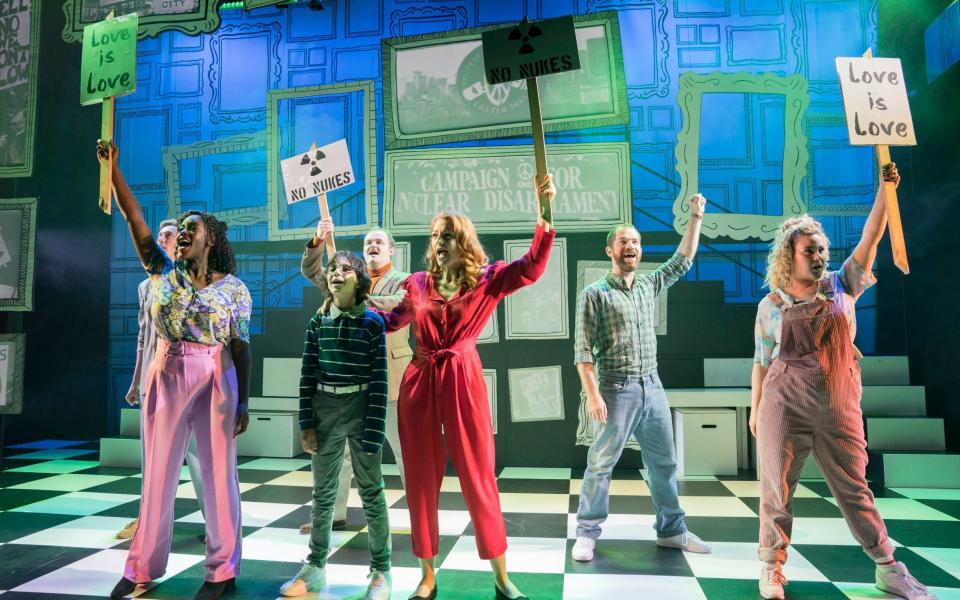Ideological terrorism is hampering ability to pen new plays, says writer in tirade on 'wokeism'

A leading British playwright has said that "ideological terrorism" and a fear of judgement or causing offence are stifling creativity to the point where writers will be reduced to writing only about people like themselves – in his case, middle-aged Jewish men.
In a tirade on “wokeism,” Ryan Craig, 49, whose dramas have been staged at the National Theatre and on the BBC, asked: “Am I going to only be confined to writing about middle-aged Jewish men? That’s going to be a problem for me because I’m going to run out of road.”
He told The Telegraph: “It used to be that we wanted to please everybody. Now we don’t want to upset anybody – anybody. But that is an impossible situation…
“It’s a fear of judgement and cancellation. There’s an element of ideological terrorism going on. I don’t want to be prevented from exploring ideas because I think that somebody’s not going to like it…
“We are all becoming polarised even within our tribes. I worry about writers who want to write about things but won’t – for fear of upsetting people. These days, upsetting people means either they won’t do your play or, if they do, you’ll get into trouble, and they won’t do the rest of your work.”
Criticisms that go to the heart of the woke debate are explored in his forthcoming book, Writing in Coffee Shops: Confessions of a Playwright, to be published by Bloomsbury on February 11.
He wrote: “I worry that artists are self-censoring to the point of creative extinction. And that’s bad news for the health of our democracy because who is left to challenge our received wisdom and accepted morality? Who will purge and cleanse and force us to see things in new ways?”
He said at a Q&A discussion after one of his plays, a young woman asked: “Who is this show for?” He said: “Pretty much every panel I’ve ever been on, someone asks a question like this. It bothers me. What’s it implying? That some people deserve theatre more than others? That writers should write for one group and not another? I don’t know any working playwright worth their salt who only wants to speak to one tribe…
“Our job is to connect to some universal truth about the human condition. We don’t stand on the door like nightclub bouncers checking everyone’s wearing the right ideological trousers.”
Earlier this month, Russell T Davies, the Bafta-winning screenwriter, told the Radio Times that gay roles should be reserved for gay actors and, in 2019, Falsettos, a West End musical about a Jewish family, sparked a row amid claims that only non-Jewish actors had been cast. Director Nicholas Hytner has also been criticised for saying that he would only put on a play that was critical of the Muslim community if it were written by a Muslim: “If a play has pretensions to authenticity it should be authentic.”

Mr Craig argued that actors and writers should be able to climb into somebody else’s skin: “That’s the whole point. You’re reaching out to somebody else’s humanity and trying to connect with that humanity. Are we going to go round asking everybody what their identity is, what their sexuality is?”
He added: “If you force all characters to speak without ever giving offence, you are not writing honestly about human behaviour and the behaviour of language.”
Mr Craig’s plays include The Glass Room, which deals with Holocaust denial, at the Hampstead Theatre, and The Holy Rosenbergs, about a Jewish family, staged at the National Theatre. He has also written extensively for television and radio, including Robin Hood for BBC1.
He recalled that, when The Holy Rosenbergs was staged in 2011, audiences hung around to discuss it: “They had a go at me. ’You haven’t got this right, I don’t agree with this…’. But it was a very fruitful, joyful interaction. I didn’t feel worried for my play’s future because people didn’t agree with some of it. Tilly Tremayne was playing the classic matriarchal Jewish mother. Most of the Jewish people who came to see the play did not believe me that she wasn’t Jewish. That’s the point. She did her job. She convinced them that she was somebody else.”
He recalled that Richard Bean’s England People Very Nice, a satire on East End immigration starring Olivia Colman at the National in 2009, was criticised for lampooning stereotypes of French Huguenots, Irish Catholics, Jews and Bangladeshis: “I wonder if Richard would even attempt to write that play now and whether the National Theatre would do that play. Or, if so, then perhaps they would do an accompanying piece of work from somebody from one of the communities that he talks about. What’s happening is it’s becoming narrower what you’re allowed to write about.”

He also recalled Gurpreet Kaur Bhatti’s play Behzti (Dishonour), which offended some Sikhs because it included scenes of rape and murder in a Sikh temple. Staged at the Birmingham Rep in 2004, it sparked a riot, prompting managers to cancel it.
Mr Craig said: “Bhatti’s play was rejected by her community. What’s happened now is that if you didn’t come from that community, you couldn’t write Sikh characters. That makes a mockery about how we put ideas and characters together.”
Britain abandoned theatre censorship in 1968, when playwrights no longer needed a licence from the Lord Chamberlain. Mr Craig said that, until a few years ago, there was complete artistic freedom: “You didn’t feel there was anything you couldn’t write about. But today, if you don’t completely tally with some people’s point of view, then you’re a traitor to their cause.”
He is now writing a play on censorship, commissioned by the Bath Theatre Royal: “It’s going to be, hopefully, a stimulating comedy of ideas.”

